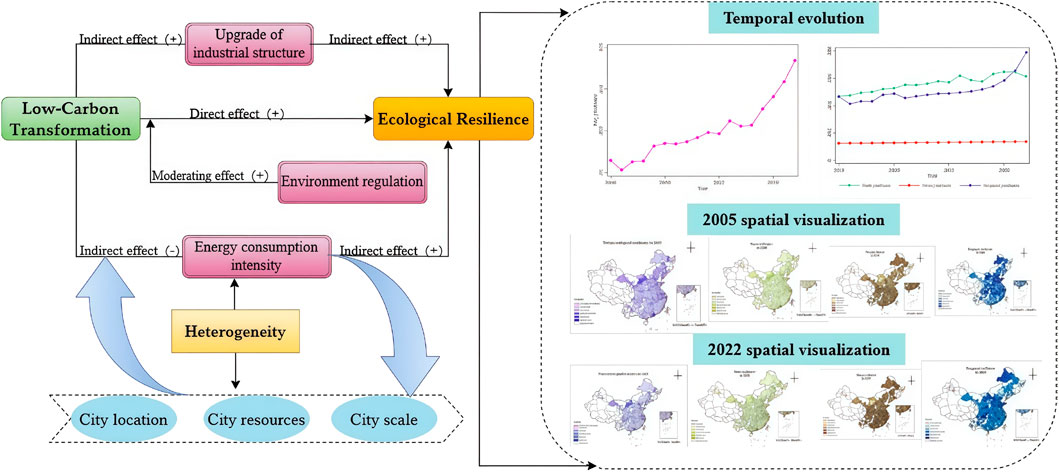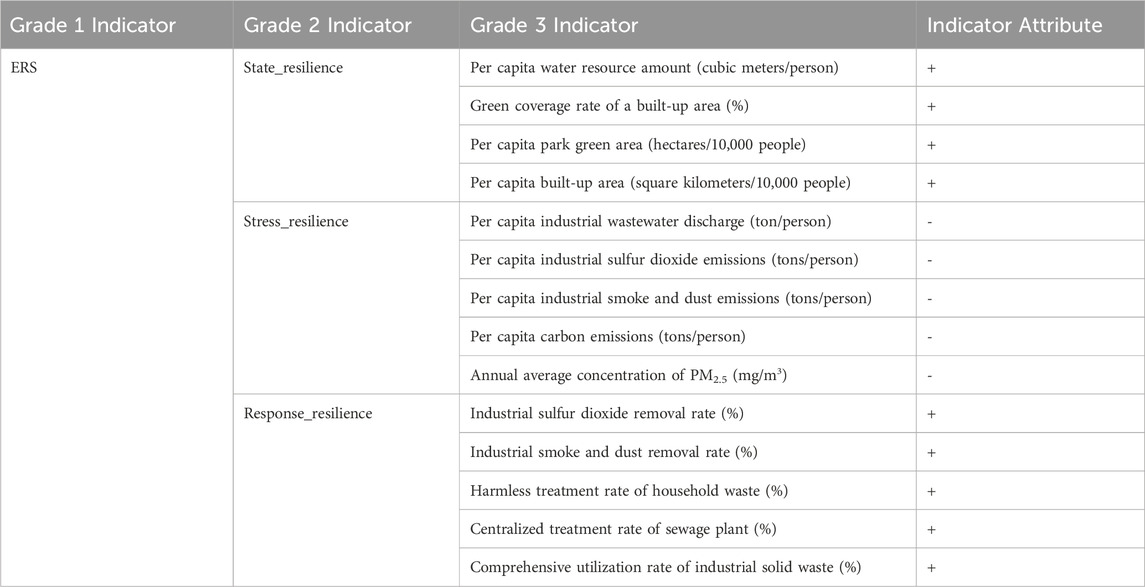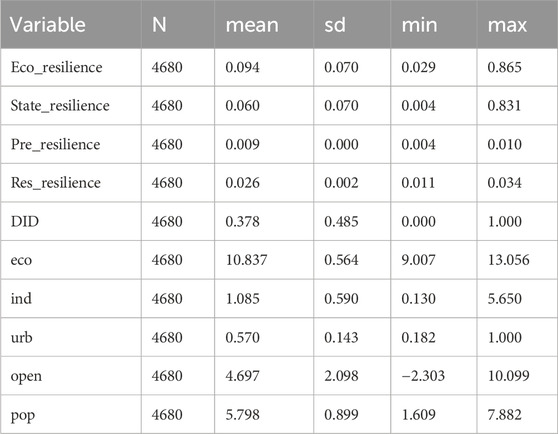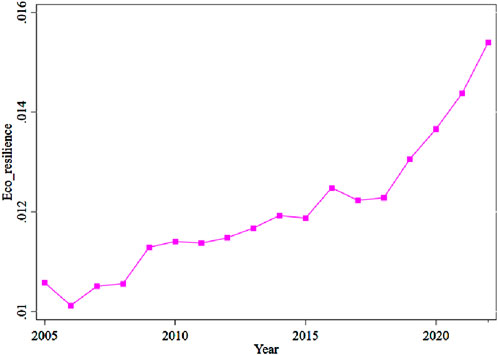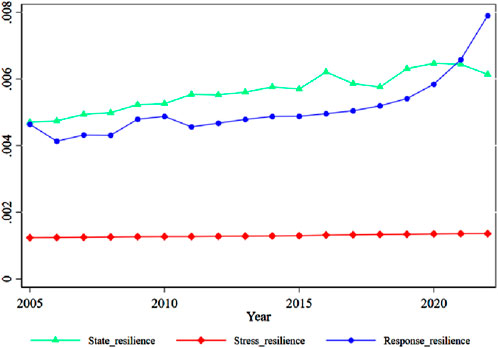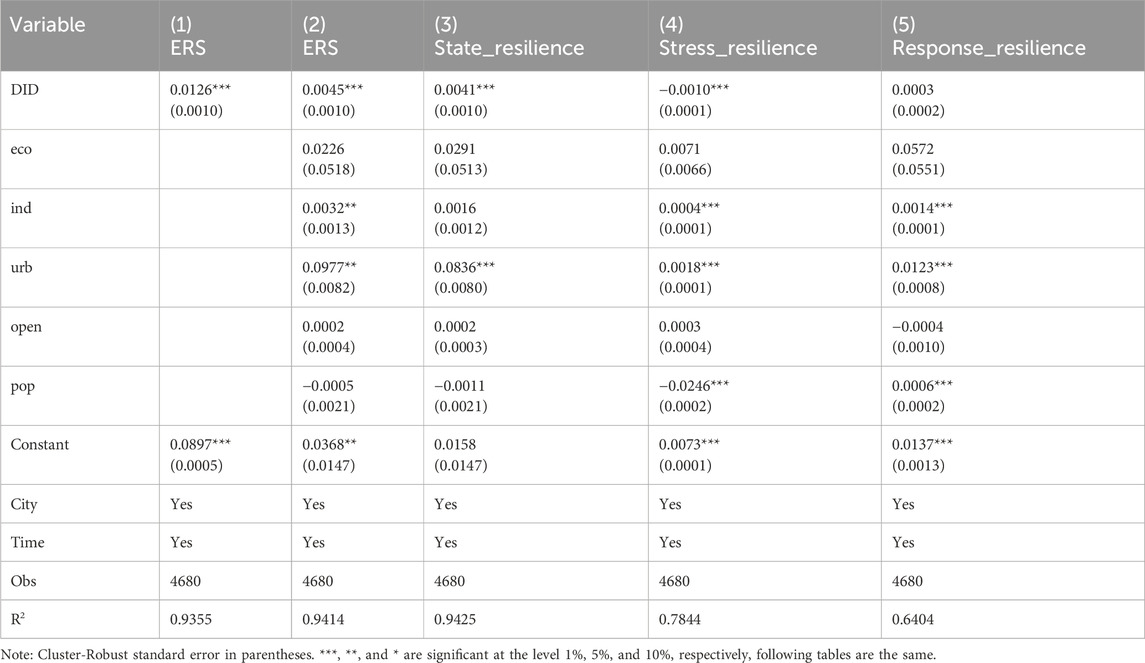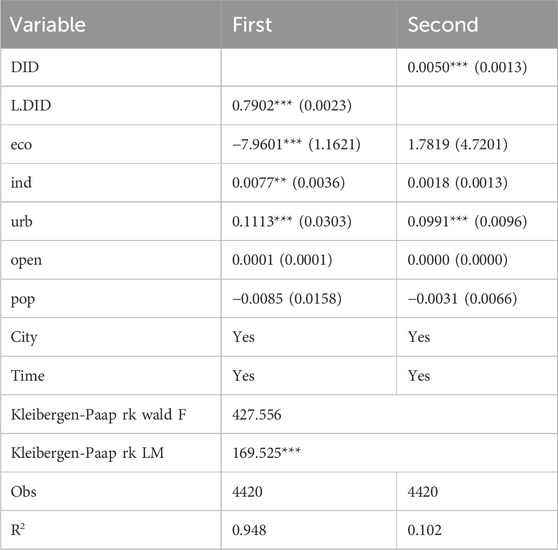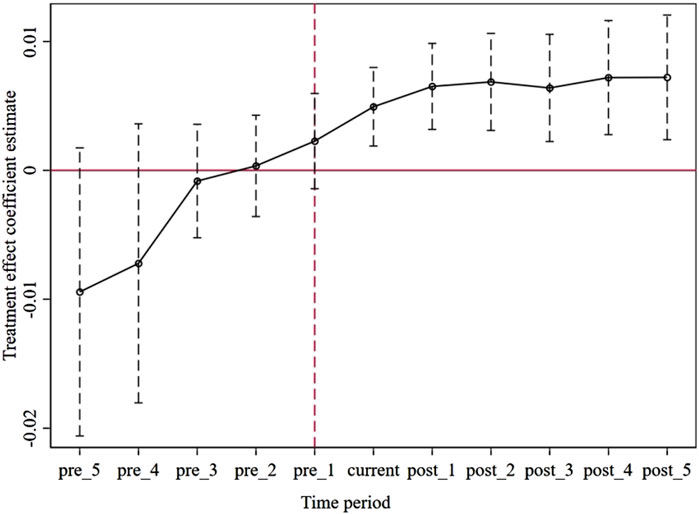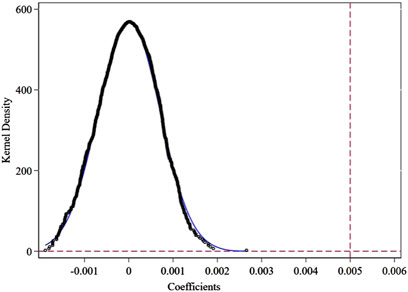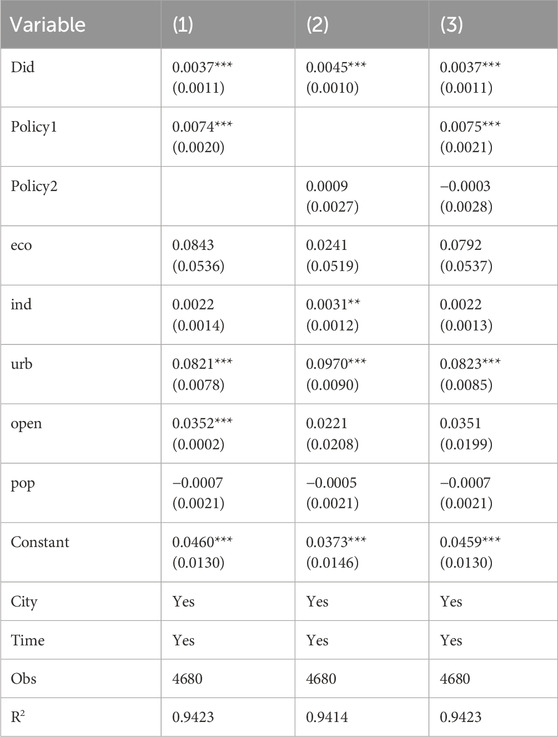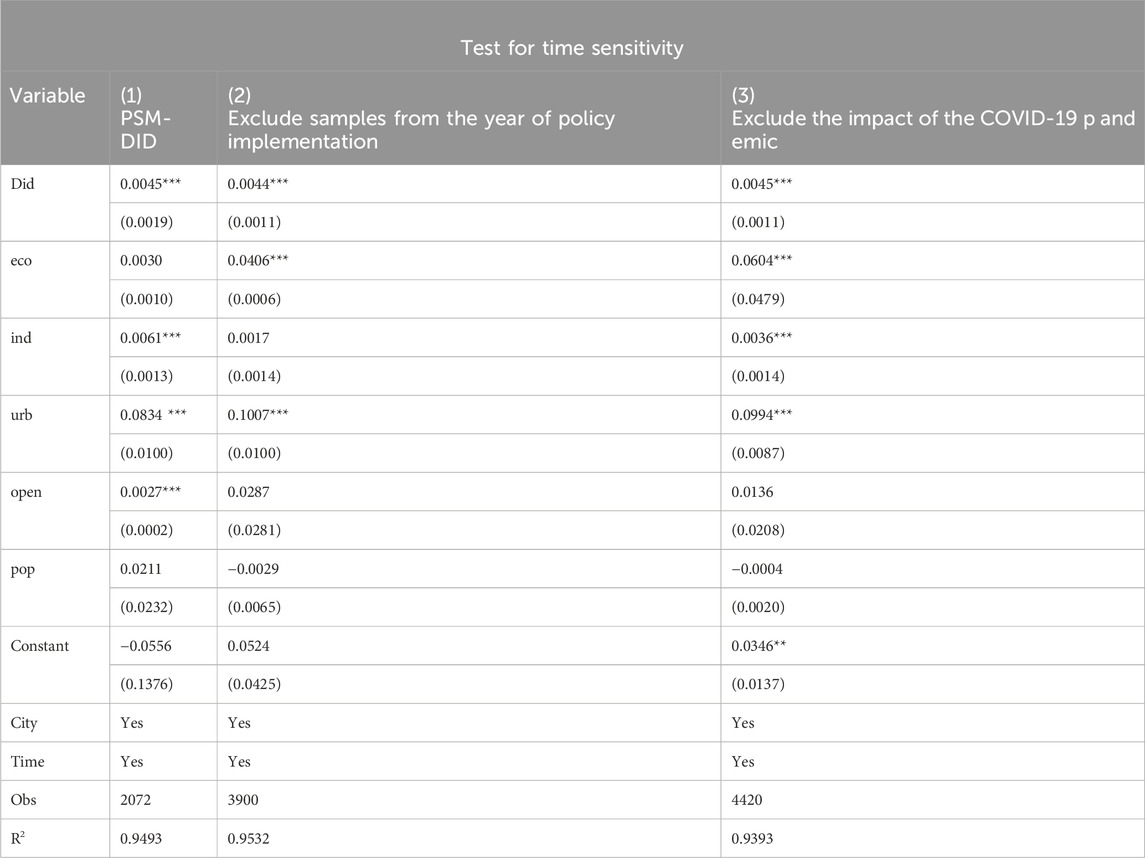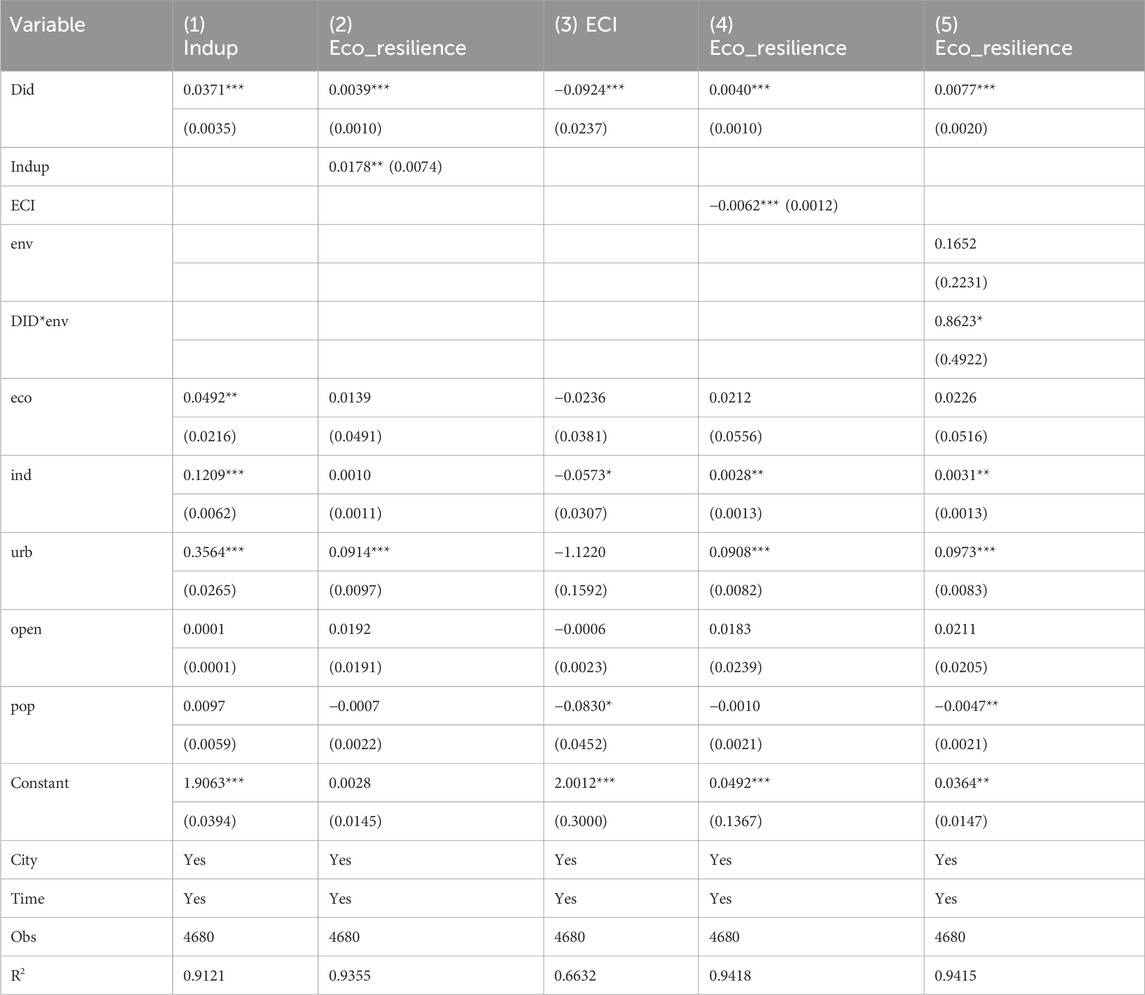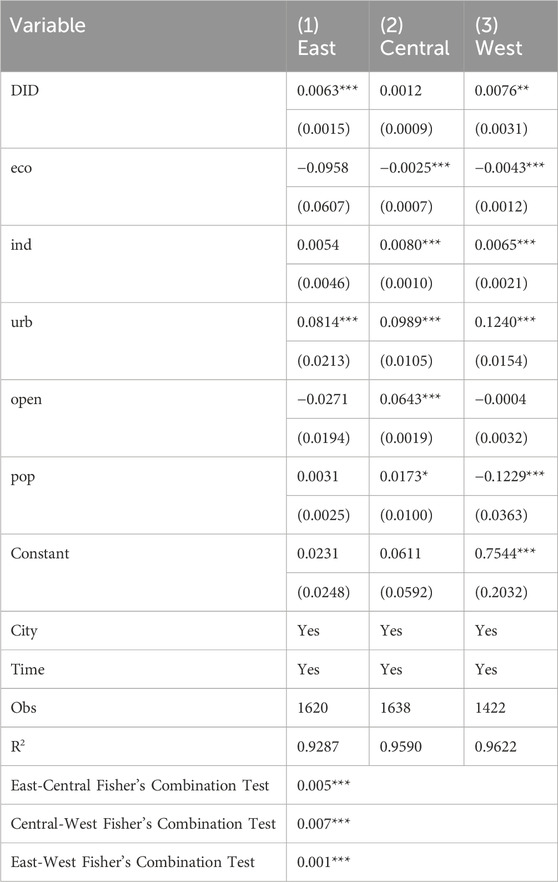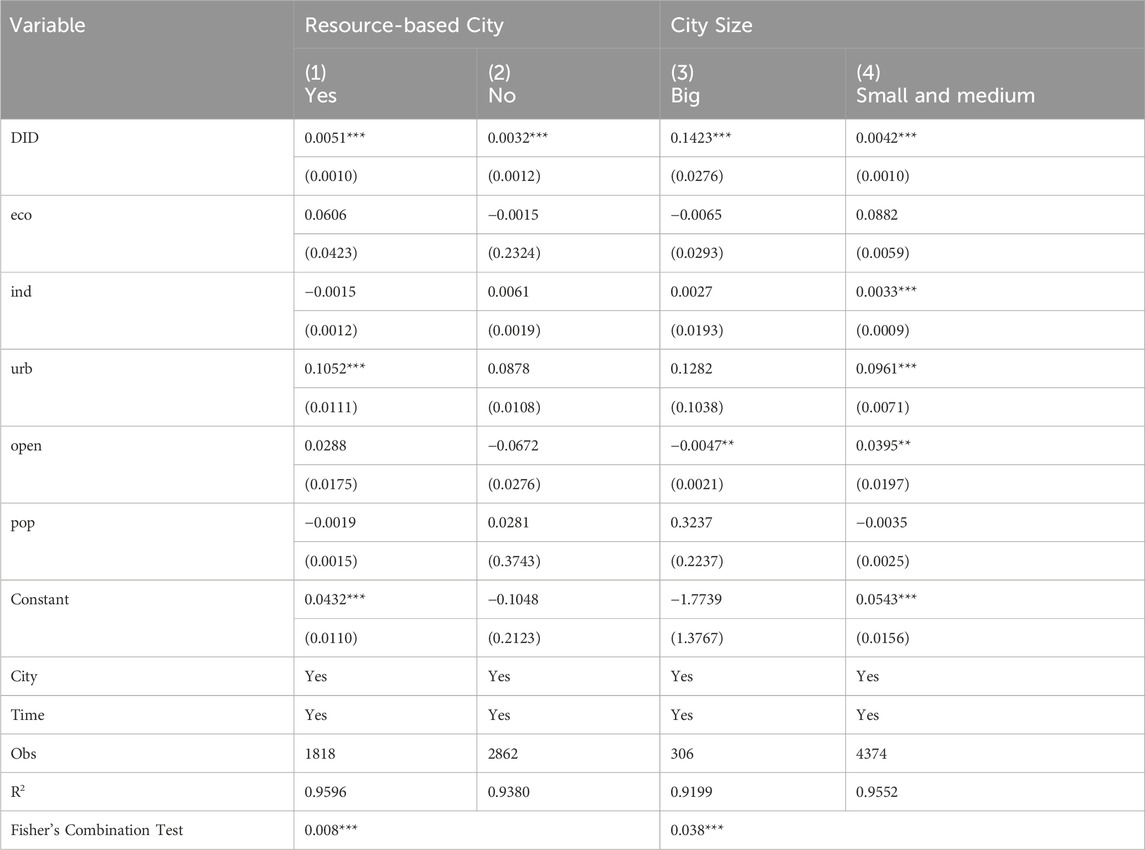- 1School of Management, Hebei University, Baoding, China
- 2The Center of Common prosperity Research, Hebei University, Baoding, China
- 3New Quality Productivity Development Research Center, Hebei University, Baoding, China
In the context of increasing global uncertainty and climate-related challenges, low carbon transformation is crucial for China to achieve its “carbon peak and carbon neutrality” objectives. This initiative also serves as a vital approach to bolster ecological capacity and maintain ecosystem stability. This study aims to systematically evaluate the policy effects of LCC pilot initiatives on enhancing urban ecological resilience, thereby providing scientific evidence for refining low-carbon development policies. To this end, the research employs a difference-in-differences (DID) model to examine the effects of low carbon transformation on ecological resilience (ERS) from 2005 to 2022, utilizing China’s LCC pilot policies as a quasi-natural experiment. The findings indicate that the low carbon transformation markedly enhances ERS, with this conclusion holding strong across multiple assessments. Mechanistic analysis further reveals that LCC construction enhances ERS by promoting industrial restructuring and upgrading of industrial structure (UIS), as well as reducing energy consumption intensity (ECI). Additionally, government-enforced environmental regulations (ERGs) act as an external force, amplifying the positive effects of LCC pilot initiatives on ERS. This study is the first to systematically examine the impact mechanisms of LCC pilot policies on ERS, filling a critical gap in policy evaluation and urban sustainable development research. The findings not only provide empirical evidence for low-carbon city construction but also offer important insights for policy optimization in global urban green transitions.
1 Introduction
In light of the interconnected issues posed by global climate change and swift industrial development, the establishment of low-carbon cities (LCCs) has emerged as a vital approach for countries striving to attain ecological sustainability (Liu et al., 2022). Ecological resilience (ERS) denotes the capacity of urban ecosystems to maintain their critical functions and infrastructure in the face of external disturbances and risks. China has achieved significant advancements in the realm of ecological environmental protection; however, the entrenched economic growth model poses challenges to immediate transformation, thereby impeding initiatives aimed at reducing ecological stress and enhancing ecological carrying capacity (Li et al., 2020). As a major contributor to global carbon emissions, China has been implementing LCC pilot projects since 2010. These initiatives focus on mitigating carbon emissions by fostering industrial transformation, optimizing energy use, and improving resource efficiency, ultimately aiming to enhance the nation’s ERS (Liu and Xu, 2022; Tang and Zhang, 2023).
A growing body of independent research focuses on the relationship between LCCs and ERS. Based on the theory of composite ecosystems, some scholars have developed a progressive strategy that integrates “industrial low-carbon transformation, energy cleanliness, and governance synergy,” emphasizing the role of social organization in policy implementation. This strategy moves away from traditional technology-centered approaches and highlights the importance of stimulating residents’ behavioral change through mechanisms such as community carbon accounts (Zhu and Li, 2024).
In the evaluation of policy effects, most scholars have utilized the quasi-natural experiment framework of LCC construction to establish difference-in-differences (DID) models, creating a research framework that examines the impact of low-carbon city pilot programs on overall urban resilience (Zhang S. et al., 2024; Zhang Z. et al., 2024). Additionally, some studies have investigated the effects of low-carbon city development on urban environmental quality and ecological efficiency (Hu et al., 2025; Ma and Sun, 2025). Research findings indicate that LCC initiatives can effectively enhance overall urban environmental quality, although their specific impacts on urban ecological efficiency demonstrates significant heterogeneous characteristics. The effectiveness of these policies is influenced by regional resource endowments and institutional environments. Cities with strong industrial foundations are more likely to achieve emission reductions and efficiency improvements through technological innovation, while resource-based cities require cross-regional ecological compensation mechanisms to balance economic and environmental goals (Pan et al., 2022)
Regarding the differentiated characteristics of urban ecological risks, some scholars have integrated the DPSIR framework and ecological network analysis model to comprehensively assess the ecosystem resilience of 35 cities in China. They found that resource-dependent cities face greater risks of ecosystem collapse due to their single industrial structure and accumulated ecological liabilities (Zhao et al., 2021). Other scholars have enhanced the “stress-sensitivity-resilience” framework, identified spatial distribution patterns of high carbon emission-sensitive areas, and proposed adaptive planning approaches based on natural solutions. These include limiting the expansion of high-energy-consuming industries in ecologically sensitive zones, restoring slope ecosystems through vertical greening and terraced field agriculture, and balancing carbon sequestration with disaster prevention functions to enhance ecosystem carrying capacity (Ghosh et al., 2022). In the coordinated development of Beijing, Tianjin, and Hebei, the ecological carrying capacity of their urban agglomeration has significantly decreased. Many scholars, both domestic and international, have identified key driving factors of ERS using the “stress-state-response” model. Research indicates that intensive l and use can be alleviated through strategies such as three-dimensional greening, mixed-function development, and cross-administrative corridor planning to connect ecological networks and reduce stress on ecological spaces (Shi et al., 2022).
While comprehensive analyses have been conducted on the effects of LCC construction and ERS, most studies focus either on LCC construction or ERS independently, lacking a systematic analysis of the complex socio-ecological interactions in the rapid urbanization process of developing countries. Meanwhile, existing studies predominantly focus on examining the relationship between low-carbon cities and urban resilience at an aggregate level, with limited granular analysis of their impact on ERS specifically. Although some research addresses urban environmental quality or ecological efficiency, these works primarily concentrate on ecological carrying or resistance capacity, failing to comprehensively assess how LCC development influences the integrated system of ERS encompassing resistance, recovery, and adaptive response capabilities - an oversight that may compromise the systematic and scientific rigor of ecological decision-making. Against this backdrop, our study specifically investigates the impact of LCC construction on urban ecological resilience, the innovation of this study lies in integrating LCC policies and ERS within a unified analytical framework, this study systematically reveals the intrinsic relationship between policy interventions and ecosystem stability, providing a novel theoretical perspective for interdisciplinary research on urban sustainable development. The potential marginal contributions are as follows: First, this integration not only addresses the theoretical fragmentation in current literature but also expands the academic boundaries of urban environmental governance. Second, by exploring transmission mechanisms through industrial structure upgrading, energy consumption intensity, and environmental regulation, we establish concrete pathways between policy implementation and resilience enhancement, these findings offer a scientific basis for policymakers to design targeted policy toolkits, providing direct guidance for optimizing the allocation of policy resources. Third, by analyzing the heterogeneous effects of LCC on ERS across cities with varying geographical locations, resource endowments, and population scales, the study challenges the validity of a “one-size-fits-all” governance approach. The empirical evidence supports the formulation of regionally differentiated policies, offering universally applicable insights for global urban green transitions.
The study is structured in the following manner: Section 2 outlines the theoretical framework and the hypotheses guiding the research; Section 3 details the design of the study; Section 4 provides a comprehensive report on the key findings, including benchmark regression results, endogeneity assessments, robustness evaluations, and analyses of underlying mechanisms; Section 5 investigates the results related to heterogeneity; and Section 6 wraps up with implications for policy. Figure 1 provides the research framework.
2 Theoretical analysis and research hypothesis
2.1 The direct impact of low carbon transformation on ERS
In recent years, the concept of green and sustainable development has attracted considerable interest, especially with the emergence of the “dual carbon” goal. The conventional approach of prioritizing swift economic expansion while neglecting environmental conservation st and s in stark contrast to China’s modernization trajectory, which advocates for a balanced relationship between humanity and the natural world (Zhou and Gao, 2025). The LCC pilot policy is fundamentally an institutional strategy aimed at improving the ecological environment by encouraging cleaner production practices and sustainable lifestyles. As key contributors to carbon pollution, companies bear significant responsibility for reducing pollution, carbon emissions, and exp and ing green spaces. This responsibility is driven both by the internal green awareness of management and external pressure from stakeholders such as the government, media, and the public (Liao and Xiao, 2025; Xiao et al., 2024).
The government assumes dual responsibilities, acting as both a facilitator and a regulator. In its role as the chief architect of LCC construction, it promotes the integration of low-carbon technologies via initiatives focused on environmental conservation, strategic policy direction, and advancements in institutional frameworks (Zhao et al., 2023). It promotes a shift for enterprises away from energy-intensive production techniques, advocating for a harmonious balance between immediate economic benefits and enduring sustainability. Furthermore, the government functions as an external regulatory entity. For instance, composite carbon policies—like carbon trading and carbon taxes—can efficiently restrict corporate carbon emissions by raising market transaction costs and pollution-related expenses (Gu et al., 2024; Lan et al., 2024), thus reducing ecological pressure. During the construction of the LCC, certain companies synchronize their operations with national policies, actively participating in energy conservation and emission reduction initiatives to improve their corporate reputation, subsequently drawing in potential investors (Zameer et al., 2024). Based on the above analysis, the first hypothesis of this study is proposed:
Hypothesis 1. Low carbon transformation contributes to enhancing ERS.
2.2 The indirect impact of low carbon transformation on ERS
In the context of China’s swift urban development and industrial growth, high-carbon industries have played a pivotal role in the national economy, acting as the main contributor to carbon dioxide emissions (Zheng et al., 2021). The creation of pilot LCCs serves as a strategic instrument for governmental planning, applying considerable external pressure that facilitates the rigorous regulation of high-pollution enterprises. Porter’s innovation hypothesis suggests that thoughtfully crafted government-enforced ERGs can stimulate innovation compensation effects for businesses, aiding in the mitigation of compliance costs. The implementation of these regulations encourages the advancement of environmentally friendly technologies (Porter and Linde, 1995; Wang S. S. et al., 2024), facilitating a transition towards more sustainable corporate practices and supporting the enhancement of industrial frameworks to attain reduced energy usage and increased value-added output. The alteration of industries characterized by high energy consumption, significant pollution, and elevated carbon emissions plays a crucial role in directly decreasing carbon emissions and alleviating the ecological strain on urban environments resulting from conventional production techniques (Zhang et al., 2023). Simultaneously, the incremental rehabilitation of the ecological l and scape will bolster ecosystem resilience and improve overall stability. Moreover, the advancements in technology associated with LCC construction offer powerful instruments for environmental observation and risk prediction, which enhance urban areas’ ability to respond to external environmental influences (Shao et al., 2024), thus improving overall ERS. Based on the above analysis, the second hypothesis of this study is proposed:
Hypothesis 2. Low carbon transformation enhances ERS by promoting UIS.
Energy is a fundamental resource for human survival and social progress. In response to energy poverty resulting from the accelerated consumption of fossil fuels, initiatives like the “Kyoto Protocol” and the “Paris Agreement” have significantly boosted global renewable energy consumption, effectively addressing climate issues and alleviating energy poverty (Dong et al., 2021; Kim and Kakinaka, 2019). LCC construction not only encourages individuals to adopt low-carbon lifestyles at the micro level but also promotes clean energy usage and reduces overall energy consumption (Shen and Sun, 2023), while facilitating industrial structure upgrades at the macro level. On 1 h and, the LCC pilot policy requires local governments in designated cities to implement rigorous energy-saving evaluations, thereby enhancing their accountability for energy conservation and the reduction of emissions (Xu et al., 2022). In pursuit of regional objectives related to energy conservation and the reduction of emissions, governmental efforts are focused on executing environmental protection initiatives and educational outreach. These programs aim to encourage the public to adopt clean energy practices, promote sustainable consumption habits, and develop a lifestyle that prioritizes energy efficiency and environmental stewardship throughout the community (Zhang and Zheng, 2023). On the other h and, the global ecological crisis’s enormous impact on the functioning of society has led people to recognize the importance of a healthy ecological environment for human health and the survival and development of future generations (Wang C. et al., 2024; Wu et al., 2024). Therefore, during the construction of LCCs, most members of society actively respond to government ecological policies, consciously adopting low-carbon lifestyles, improving the energy consumption structure in daily life, and reducing ECI (Liu and Xu, 2022; Yang and Liu, 2025). The inhibitory effect of LCC construction on total energy consumption indirectly promotes improved energy efficiency, reduces ECI, and lessens pollution to the ecological environment, providing favorable conditions for maintaining the ecosystem and enhancing ERS. Based on the above analysis, the third hypothesis of this study is proposed:
Hypothesis 3. Low carbon transformation can reduce ECI and enhance ERS.
LCC construction, as a regional pilot policy under national ecological planning, is fundamentally an environmental intervention mechanism led by the government (Yan and Jie, 2024). To engage diverse social stakeholders in the development of LCCs, the Chinese government has consistently highlighted principles of environmental stewardship, including pollution mitigation, emission control, green initiatives, and energy efficiency. The government has implemented a variety of policies that integrate beneficial incentives with restrictive measures, employing mechanisms such as tax incentives, green finance, and obligatory penalties (Chen et al., 2024; Shafi et al., 2023; Wang et al., 2023). These policies promote or necessitate the rapid transition to alternative energy sources, the innovation of processes, the implementation of sustainable technologies, and the reduction of pollutant emissions (Huang et al., 2021; Zhou et al., 2023). The synergistic application of diverse environmental regulatory policy instruments can significantly enhance policy oversight, establishing a robust deterrent to carbon emissions from corporations. This contributes to the mitigation of pollutants originating from coal-based energy systems, enhances the advancement and application of renewable energy technologies, and encourages the adjustment and optimization of energy structures (Li and Taeihagh, 2020). Additionally, ERGs possess dynamic adaptability, such as carbon emissions trading systems that guide resources toward low-carbon areas via market mechanisms, enhancing the buffering capacity of ecosystems against climate impacts (Zhang Y. F. et al., 2020). ERGs issued by the government not only contribute to spreading the ecological benefits of LCC construction but also help establish a comprehensive ERS strengthening mechanism of “emission reduction from sources + process control + end restoration” through external institutional constraints, thereby improving urban ecological status and response resilience (Kim and Kakinaka, 2019). Based on the above analysis, the final hypothesis of this study is proposed:
Hypothesis 4. ERGs enhance the role of low carbon transformation in enhancing ERS.
3 Research design
3.1 Model settings
3.1.1 Benchmark model
A DID model, based on quasi-natural experiments of LCC pilot policies, was developed to estimate the impact of LCC construction on ERS. The model is specified as follows:
Where,
3.1.2 Mechanism model
This research investigates the roles of industrial structure upgrading and ECI as mediating variables, with ERG functioning as a moderating variable, to analyze their effects on the relationship between LCC construction and ERS. The precise configuration parameters are outlined below:
Formulas 2, 3 represent models for the mediating effects of industrial structure upgrading and ECI, with
3.2 Variable selection
3.2.1 Explained variable: ERS (Eco_resilience)
The concept of “resilience” pertains to an organism’s capacity to withst and, adjust to, and recuperate from external disturbances. Based on the conceptual understanding of resilience and ecological principles, an evaluation index system for ecological resilience was constructed from three dimensions: state resilience, pressure resilience, and response resilience. State resilience reflects the self-organizing capacity of urban ecosystems to withstand persistent external disturbances, representing their inherent characteristics. This dimension includes positive indicators such as per capita water resources, green coverage rate in built-up areas, per capita park green space, and per capita built-up area. Pressure resilience captures the adverse shocks experienced by urban ecosystems, measuring their carrying capacity through indicators including per capita industrial wastewater discharge, per capita industrial sulfur dioxide emissions, per capita industrial soot emissions, per capita carbon emissions, and annual average PM2.5 concentration. Response resilience represents the proactive measures taken by ecosystems to counteract adverse shocks, reflecting their adaptability and recovery potential. The complete index system is presented in Table 1. This study employs the entropy weight method to objectively assign weights to each indicator. The method’s core principle involves calculating the information entropy of indicators to quantify data variability. According to information theory, indicators showing significant variation across samples (with low entropy) contain more discriminative information and thus receive higher weights, while indicators with homogeneous values (high entropy) are assigned lower weights. The comprehensive ecological resilience index is then calculated using weighted averaging.
3.2.2 Explanatory variable: LCC pilot policy (DID)
By the year 2022, China had launched three distinct cohorts of LCC pilot projects in the years 2010, 2012, and 2017. In this investigation, the dummy variable representing the LCC pilot policy functions as the explanatory variable, where the year of policy implementation and the following years are designated a value of 1, while all other years are assigned a value of 0. In instances where pilot cities exhibit overlap across various years, the earliest year designated for the pilot is utilized as the year of policy implementation.
3.2.3 Mechanism variables
3.2.3.1 Mediating variables
The upgrading of industrial structure (UIS) and ECI. The implementation of LCC pilot policies fosters adaptations in production and lifestyle, facilitating the restructuring of industries. The overall industrial structure upgrade is assessed through the ratio of primary, secondary, and tertiary industries, as illustrated in Formula 5.
LCC construction provides residents with a cleaner and more visually appealing living environment, which fosters an intrinsic motivation among society members to actively preserve and protect this environment. Driven by heightened environmental awareness, individuals may reduce energy consumption, improve energy efficiency, and accelerate the adoption of energy conservation and emission reduction practices. Accordingly, ECI is quantified by per capita energy consumption. A lower ECI indicates higher energy utilization efficiency and reduced marginal environmental pollution.
3.2.3.2 Moderating Variable
The government, as the main entity tasked with safeguarding the environment, plays a crucial role in the strategic planning and direction of LCC development. The intricate balance between human activity and natural ecosystems is a fundamental aspect of China’s approach to modernization. For decades, the Chinese government has focused on achieving a harmonious relationship between economic development and ecological preservation, producing a variety of policy documents to guide efforts in environmental conservation. Table 2 shows environment-related keywords extracted from local government work reports, the assessment of ERG is quantified by the ratio of terms associated with environmental matters found within these reports (Chen et al., 2018).
3.2.4 Control variables
The ecosystem is shaped by numerous interacting factors. In this investigation, various control variables such as economic development, industrial structure, urbanization level, openness to external influences, and population density were integrated to assess the net impact of LCC policies on ERS. The natural logarithm of per capita regional GDP serves as an indicator of economic development. The industrial structure is quantified by the proportion of the tertiary sector relative to the secondary sector. Urbanization is assessed by the ratio of the urban populace to the overall population. Openness is measured as the natural logarithm of foreign direct investment. Population density is quantified through the natural logarithm of the l and area available per individual.
3.3 Data source
This investigation encompasses the timeframe from 2005 to 2022, concentrating on prefecture-level cities within China. The primary source of data was the “China Urban Statistical Yearbook.” A sample comprising 260 cities was meticulously chosen, omitting those with considerable data deficiencies, while absent values were addressed using linear interpolation techniques. Table 3 presents the descriptive statistics for each variable analyzed. The st and ard deviation of ERS is 0.070, while the mean is 0.094, suggesting considerable variability among cities.
4 Empirical results
4.1 Analysis of the characteristics and facts of ERS
The ERS is a vital component for the sustainable advancement of human communities and ecological systems. China has consistently emphasized the importance of ecological balance, enacting policies aimed at regulating both production and consumption, promoting sustainable practices, and minimizing energy usage. These initiatives seek to augment the resilience of urban ecosystems and optimize ERS. Using the evaluation index system presented in Table 1, the overall level of ERS in China from 2005 to 2022, along with the sub-dimensions of state resilience, stress resilience, and response resilience, was calculated and their temporal evolution plotted. Figure 2 shows the temporal evolution of overall ERS, revealing a significant and sustained growth trend, indicating the success of China’s urban ecological governance. Figure 3 shows the temporal evolution of state resilience, stress resilience, and response resilience. Response resilience exhibits the most noticeable growth, suggesting positive development in the ecological responsiveness of Chinese cities. State resilience also shows an upward trend, but not significantly, and urban ecological stress has not decreased over time. This may be due to the inadequacy of traditional environmental governance methods to address emerging pollution types, such as persistent organic pollutants (POPs), endocrine disruptors (EDCs), and microplastics, which are not easily detected by conventional monitoring methods and remain unregulated in current policies (Zhang X. M. et al., 2020).
To investigate the spatial differentiation of ERS in China at different time points, this study utilized ArcGIS 10.2 to conduct spatial visualization analysis of ERS and its sub-dimensions for 2005 and 2022 using the natural breaks method (Figures 4, 5). In 2005, most cities had moderate or lower levels of ERS, with notable spatial imbalances, particularly along the eastern coast. By 2022, the distribution of ERS had become more balanced, with fewer regions showing extreme polarization. This shift reflects China’s transition from fragmented ecological governance to more systematic and holistic governance, helping to reduce the ERS gap between cities and improving overall ecological governance efficiency.
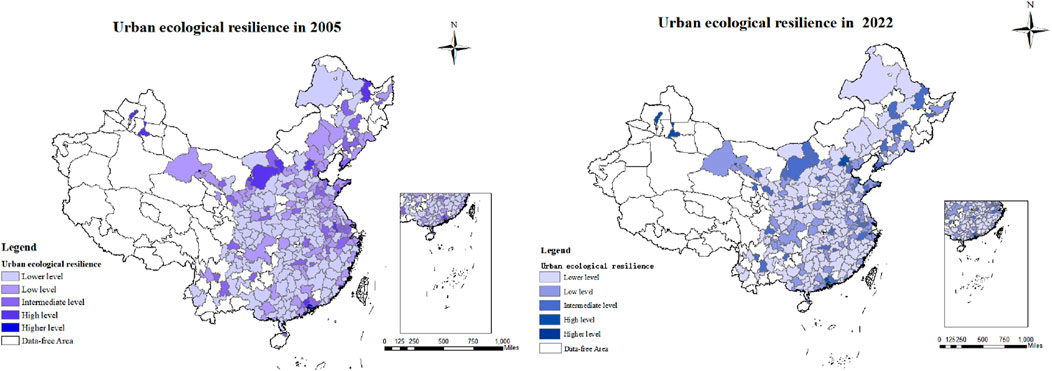
Figure 4. Spatial Distribution of ERS in Chinese Cities in 2005 and 2022. Note: Based on the standard map (Approval No. GS (2022) 1873) from the Ministry of Natural Resources’ Standard Map Service, unmodified.
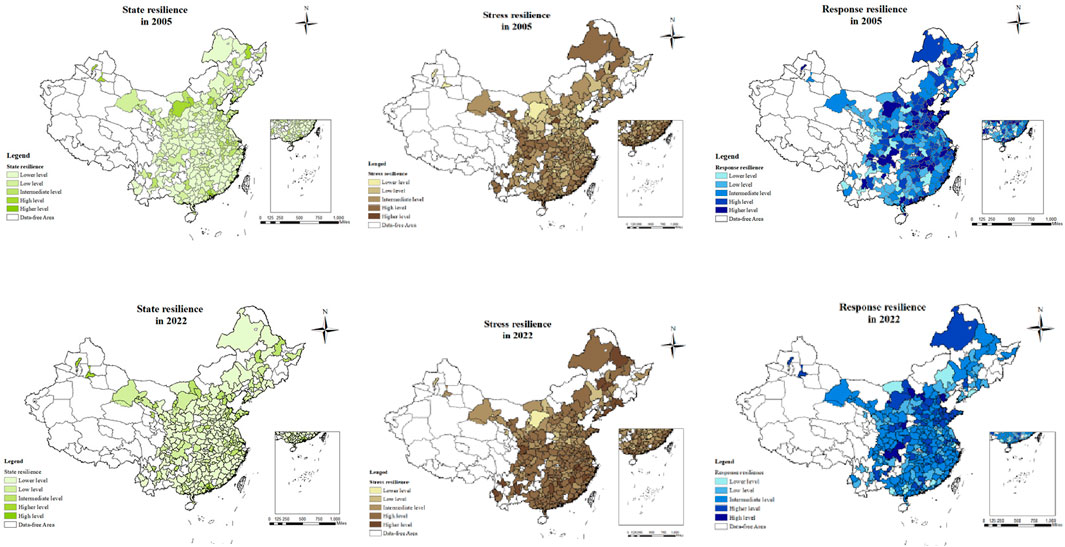
Figure 5. Spatial Distribution of Sub-dimensions of ERS in Chinese Cities in 2005 and 2022. Note: Based on the standard map (Approval No. GS (2022) 1873) from the Ministry of Natural Resources’ Standard Map Service, unmodified.
Figure 5 illustrates the spatial distribution of the sub-dimensions of ERS in Chinese cities for 2005 and 2022. In 2005, the spatial distribution of state resilience and stress resilience across cities was relatively balanced, but spatial differences in response resilience were more pronounced, particularly in North China, where ecological response resilience was significantly higher. By 2022, ERS showed a slight shift in spatial distribution, still maintaining balance. ERS in most cities increased significantly to a higher level, with more evenly distributed spatial patterns. The spatial polarization effect of urban ecological response resilience weakened, showing an overall increase with a more moderate level.
4.2 Benchmark regression
The development of LCCs signifies a crucial strategic initiative by China to address carbon pollution, resonating with the principle that “Lucid waters and lush mountains are invaluable assets” in this contemporary context. Although the immediate advantages of LCC construction on the ecological environment might be constrained, it is crucial to investigate whether this results in the long-term improvement of ERS. Table 4 illustrates the benchmark regression outcomes for LCC pilot policies concerning ERS. The first column displays the results of a univariate regression without controlling for additional variables. The DID coefficient is positive and statistically significant at the 1% level, indicating that LCC pilot policies positively influence ERS. To account for potential confounding variables, a set of control variables was implemented. The findings presented in column (2) of Table 4 indicate that the DID coefficient continues to exhibit a positive value and maintains statistical significance at the 1% level, thereby reinforcing the beneficial influence of LCC pilot policies on ERS. The initial verification of Hypothesis 1 has been achieved. This empirical finding aligns with and extends previous research on the carbon-reduction effects of low-carbon cities. The results demonstrate that low-carbon city initiatives not only effectively enhance public awareness of ecological protection and reduce urban carbon emissions (Xu and Liu, 2025), but also contribute to improving the resilience level of entire ecosystems and elevating overall environmental quality. Additionally, the results in columns (3) to (5) of Table 4 reveal that LCC construction significantly affects urban ecological state and stress resilience. Specifically, the coefficient for ecological state resilience is positive, while the coefficient for stress resilience is negative, suggesting that LCC policies enhance ecological state resilience and reduce ecological stress resilience. The results in column (5) suggest that LCC construction positively impacts ecological response resilience, but this effect is not statistically significant, indicating that LCC construction does not significantly improve the response capacity to ecological environmental crises. From a theoretical perspective, these findings significantly extend ecological modernization theory by not only validating the effectiveness of the “prevention-improvement” pathway but also revealing the existence of policy blind spots, thereby providing new empirical evidence for refining urban climate governance frameworks. It is particularly noteworthy that these results simultaneously reflect how current policies emphasize front-end prevention over emergency response capacity building, which substantially constrains the efficiency of ecological crisis response.
4.3 Endogeneity test
To mitigate issues related to endogeneity, the lagged term of the LCC pilot policy was employed as an instrumental variable in the two-stage least squares (2SLS) estimation process. The findings presented in Table 5 demonstrate that the Kleibergen-Paap rk LM statistic successfully met the significance threshold at the 1% level, thereby affirming the suitability of the instrumental variables employed. The Kleibergen-Paap rk Wald F statistic exceeds the critical value (16.38) of the Stock-Yogo 10% st and ard, indicating no weak instrument problem. The first-stage estimated coefficient of the instrumental variable is significant at the 1% level, and the second-stage regression coefficient of the explanatory variable is significantly positive, suggesting that after accounting for endogeneity, the effect of low-carbon city development on ERS remains unchanged, further confirming the robustness of the study’s conclusions.
4.4 Robustness test
4.4.1 Parallel trend test
Parallel trend test is a prerequisite for conducting unbiased DID estimation. A parallel trend testing model was set up as shown in Formula 6 to exclude alternative explanations for the results based on prior trends.
Where,
4.4.2 Placebo test
A placebo test was conducted by r and omly selecting a sample of cities, matching the number of the treatment group in the baseline regression, and treating this sample as the new treatment group. This process was repeated 1,000 times, followed by re-regression. Figure 7 illustrates the distribution of the kernel density coefficient and p-values for LCC pilot policies following the process of r and om sampling. The average estimated coefficient approaches zero and adheres to a normal distribution pattern. The predominant p-values are above 0.1, indicating that unmeasured variables likely do not have a significant impact on the ERS enhancements resulting from LCC policies, thus reinforcing the reliability of the findings.
4.4.3 Excluding interference from other policies
In areas facing considerable ecological decline, the incorporation of various environmental policies greatly improves ERS efforts. From 2005 to 2022, China implemented a range of policies focused on environmental conservation, such as the ecological civilization demonstration zones pilot policy introduced in 2013 and the new energy demonstration cities policy launched in 2014. To mitigate the potential confounding effects of these policies throughout the study duration, dummy variables were designated a value of 1 for the years in which these policies were enacted and the following years, while being assigned a value of 0 for all other years. The baseline regression model was enhanced by the inclusion of these dummy variables, with the results presented in Table 6. Policy1 pertains to the pilot initiative for ecological civilization demonstration zones, whereas Policy2 relates to the policy for new energy demonstration cities. The findings presented in Table 6 indicate that, upon controlling for these two policies, the DID coefficient continues to exhibit a significantly positive value. This suggests that the influence of other policies does not notably disrupt the efficacy of LCC policies. This validates the consistency of the benchmark regression findings.
4.4.4 PSM-DID
PSM-DID serves as a robust approach to address selection bias through the creation of propensity score matching between the treatment and control groups, thereby forming a novel treatment group. Control variables were utilized as matching features, and a 1:1 nearest neighbor matching technique was applied for the regression analysis. The findings presented in column (1) of Table 7 indicate that the influence of low-carbon city pilot policies on ERS continues to exhibit a significantly positive effect, with both the magnitude of the coefficient and its significance aligning with the benchmark regression outcomes. This validates the results obtained from the benchmark regression analysis.
4.4.5 Time sensitivity test
Specific implementation plans for low-carbon pilot cities are typically developed after policy approval, with a preparation period for implementation. Before actual policy implementation, local governments may adjust behavior under the guise of piloting, leading to potential confusion between nominal and actual policy effects. To achieve a more precise evaluation of the actual effects of the policy, data from the years of implementation (2012, 2010 and 2017) were omitted for the purpose of re-regression analysis. The findings presented in column (2) of Table 7 reveal that the estimated coefficient for LCC pilot policies is both positive and significant at the 1% level. This indicates that the observed impact on ERS is not merely a consequence of short-term effects during the policy implementation years, thereby reinforcing the robustness of the results.
Due to the significant disturbances induced by the COVID-19 p and emic in 2020, which presumably impacted the efficiency of ecological governance, the observations from that year were omitted from the analysis. Therefore, this study excludes the sample observations from 2020 and re-examines the remaining samples. The results, shown in column (3) of Table 7, indicate that the DID estimate and its significance have not changed significantly, suggesting that the COVID-19 p and emic did not have a substantial impact on the effectiveness of LCC pilot policies in enhancing ERS. This underscores the dependability of the results concerning the efficacy of LCC construction in improving ERS.
4.5 Mechanism test
The benchmark regression results above confirm the effectiveness of LCC construction in enhancing ERS, but further exploration is needed to identify the transmission mechanisms.
From a production perspective, the excessive pursuit of economic gains through environmentally detrimental practices significantly contributes to ecological degradation. The government-led construction of LCCs imposes constraints on environmentally harmful practices, encouraging companies to upgrade their industrial structures and adopt cleaner, greener methods. Industrial structure upgrading was used as a mediating variable to test whether this pathway holds true. The results in columns (1) and (2) of Table 8 show a significantly positive DID coefficient, indicating that LCC construction is positively correlated with industrial structure upgrading. The results in column (2) further demonstrate that both the DID coefficient and the industrial structure upgrading coefficient are positive and statistically significant at the 5% level, indicating that LCC construction enhances ERS by promoting industrial structure upgrading, thus confirming Hypothesis 2.
LCC construction provides a cleaner living environment, motivating individuals to actively engage in environmental protection efforts aimed at maintaining a healthy ecological environment. Among these efforts, energy consumption plays a crucial role in daily life, as it directly reflects energy use intensity, which in turn reflects the negative impacts on the ecological environment. In this study, ECI is used as a mediating variable to test whether it acts as a “bridge” in the relationship between LCC construction and ERS. The results in columns (3) and (4) of Table 8 show that LCC construction has a significantly negative effect on ECI, suggesting that LCC construction helps to reduce ECI. The results in column (4) show that the DID estimate is positive and the coefficient for ECI is negative, with both passing the 1% significance test, meaning that LCC construction enhances ERS by reducing ECI, confirming Hypothesis 3.
While LCC policies are predominantly influenced by governmental directives, profit-driven enterprises frequently engage in unlawful pollutant discharges during their execution. ERG serves as a vital mechanism in curbing such behaviors, acting as an external influence. To clarify the role of ERG, this section introduces an interaction term between LCC policies and ERG into the baseline regression model. The results in column (5) of Table 8 show that the interaction term has a positive coefficient and is statistically significant at the 10% level, indicating that ERG positively moderates the relationship between LCC construction and ERS, thereby strengthening the impact of LCC construction on ERS, confirming Hypothesis 4. The mechanism analysis results partially align with the findings of K. Chen et al., further validating the positive role of industrial structure upgrading and environmental regulation in urban pollution reduction, carbon mitigation, and other ecological effects (Chen et al., 2022). These findings provide valuable references for governments when formulating environmental and industrial policies.
5 Heterogeneity test
5.1 Heterogeneity of urban locations
Variations in economic foundations, industrial structures, resource endowments, and policy interventions among different regions can lead to differing effectiveness of LCC pilot policies and their subsequent influence on ERS. A regression analysis was performed on sub-samples from eastern, central, and western China to investigate the impacts of LCC construction on ERS in these areas. The Fisher combination test, utilizing a 500-sample Bootstrap method, was employed to evaluate the disparities in coefficients across different groups. The findings presented in Table 9 indicate that the differences in coefficients among regions are statistically significant at the 1% level, suggesting that the influence of LCC construction on ERS exhibits considerable variation across different regions. The estimated coefficients for LCC pilot policies across all three regions were positive, indicating that LCC construction plays a role in enhancing ERS. However, further examination indicated that the DID coefficients for the eastern and western regions were statistically significant, with the western region showing relatively larger DID values. The DID coefficient for the central region did not reach significance, indicating that the construction of LCC had a notable positive impact on ERS in both the eastern and western regions, while the central region did not exhibit such an effect. This phenomenon can be linked to the central region’s diminished capacity for scientific and technological innovation. According to the China Statistical Yearbook on Science and Technology 2023 and the China Industrial Economic Development Report 2021, in 2022, the R&D expenditure intensity in China’s central region reached only 1.6%, below the national average. Meanwhile, the region has disproportionately absorbed the “three-high” industries (high-energy-consumption, high-pollution, high-emission) from eastern coastal areas. From 2015 to 2020, the output value share of energy-intensive industries in the region exceeded the national average by 6.2 percentage points, with traditional high-energy-consumption sectors such as cement and steel witnessing an average annual growth rate of 12.5% in transferred production capacity. This reliance leads to conflicts over resources and the environment, which obstruct the development of LCCs and diminish their impact on ERS.
5.2 Heterogeneity of resource characteristics
In cities rich in natural resources, excessive dependence on these resources for economic growth leads to ecological degradation, creating long-term challenges such as the “carbon curse” and “resource curse” (Peng et al., 2025; Zhou et al., 2022). In the framework of the “dual carbon” objective, it is crucial to analyze the impact of LCC construction on ERS in urban environments with diverse resource attributes. A comparative analysis was performed between cities classified as resource-based and those identified as non-resource-based, utilizing the framework established by the “National Sustainable Development Plan for Resource-Based Cities (2013–2020)” released by the State Council of China in 2013. The findings presented in columns (1) and (2) of Table 10 demonstrate that the Fisher combination test, utilizing 500 sampling iterations, produces a significant p-value at the 1% level. This suggests a notable difference in the impact of LCC construction on ERS between resource-based and non-resource-based cities. Specifically, LCC policies have a beneficial impact on ERS in both categories of cities, yet the estimated DID coefficient is markedly greater in resource-based cities. These findings are inherently consistent with existing research on ecological resilience in resource-based cities (Peng et al., 2025). The underlying rationale may be that resource-based cities tend to concentrate numerous energy-intensive, high-emission, and polluting industries to enhance resource extraction and utilization efficiency. This industrial clustering gradually pushes urban ecological carrying capacity toward its threshold while continuously intensifying environmental pressures. LCC policies emphasize sustainable resource utilization and environmental protection. They facilitate widespread adoption of decarbonization through low-carbon technologies while improving energy structures and carbon efficiency to promote ecosystem recovery (Zeng et al., 2023). Through multidimensional reforms, low-carbon pilot initiatives have increased investments in clean energy, green technologies, and sustainable industries. Simultaneously, they have progressively phased out outdated and highly polluting production capacities, fostering coordinated industrial development. These measures collectively enhance the overall ecological resilience of resource-dependent cities (Li et al., 2024).
This indicates that the enhancement effect of LCC policies on ERS is particularly significant in resource-based cities, which experience elevated energy consumption, emissions, and pollution that strain their ecological carrying capacity, resulting in heightened ecological stress. In these scenarios, the application of LCC policies exerts a direct and considerable influence on ERS, leading to notable enhancements in the urban ecological environment.
5.3 Heterogeneity of urban size
Cities of different sizes demonstrate significant variations in resource aggregation, industrial absorption, policy response, and infrastructure development, all of which influence the effectiveness of LCC policies in promoting ERS. The “Notice on Adjusting the Urban Size Classification St and ards” released by the State Council of China in 2014 delineates that urban areas with populations exceeding 1 million are categorized as large cities, whereas those with populations below this threshold are identified as small and medium-sized cities. Regression tests were conducted on two sub-samples, with the findings displayed in columns (3) and (4) of Table 10. The inter-group coefficient difference, evaluated through the Fisher combination test with 500 sample iterations, indicates a notable distinction between the two groups. Moreover, the policies implemented by LCC pilots demonstrate a notable positive impact on emergency response in both large urban areas and smaller to medium-sized municipalities. Nonetheless, an analysis of the DID coefficients indicates that LCC policies exert a markedly more pronounced influence on ERS in urban areas of considerable size. This suggests that larger urban areas, equipped with enhanced resources and stronger policy backing, are more adept at harnessing the advantages of LCC construction, resulting in more pronounced enhancements in ERS relative to smaller urban centers.
6 Conclusion and policy recommendations
The ERS functions as a crucial “protective barrier” that ecosystems depend on to endure external shocks. China is presently undergoing a pivotal stage in the development of its ecological civilization, striving to create a “beautiful China” while pursuing national rejuvenation. Enhancing urban ecosystems has emerged as a pivotal goal in this contemporary phase of ecological advancement. In the quest for achieving the “dual carbon” objective, the advancement of low-carbon technologies offers a substantial opportunity to enhance low-carbon sectors, refine energy frameworks, and elevate environmental st and ards. Nevertheless, the degree to which LCC construction can significantly improve overall urban ecosystem resilience necessitates additional research. This research utilizes a DID model to investigate the effects, underlying mechanisms, and variability of LCC construction on ERS, considering LCC pilot policies as a quasi-natural experiment. The examination centers on 260 prefecture-level cities in China over the period from 2005 to 2022. The findings suggest that LCC construction plays a crucial role in augmenting urban ecosystem resilience, and this assertion holds strong even after tackling endogeneity issues and conducting various robustness assessments. The analysis of mechanisms indicates that the construction of LCC plays a significant role in enhancing environmental resilience by facilitating industrial restructuring, lowering ECI, and leveraging robust ERGs that support environmental resilience in low-carbon urban areas. The analysis of heterogeneity uncovers notable differences in the impacts of LCC construction on ERS among various cities, influenced by factors such as geographical location, resource attributes, and urban scale. Specifically, the policies implemented by LCC pilots exhibit a more significant influence on ERS in urban areas situated in eastern and western China, as well as in resource-dependent cities and larger metropolitan regions. The fundamental reason why LCC policies significantly enhance ERS lies in China’s distinctive policy pilot program model. Through the two-way interaction between central environmental inspections and local innovations, a unique “pressure-response” mechanism has been formed. The gradual replacement of high-energy-consumption and high-pollution industries with emerging industries has effectively provided cities with a healthier “hematopoietic system.” Meanwhile, the increased proportion of clean energy is equivalent to installing a more efficient “cardiopulmonary function” for cities. The enabling role of environmental regulations has strengthened the “immune system” of urban ecology, forcing enterprises to pursue green transformation by increasing the cost of environmental violations. Notably, the variability in policy effectiveness reflects the uneven regional development in China and provides valuable references for tailoring differentiated policy solutions to different cities.
In light of these observations, this study proposes the following policy recommendations for China and other countries respectively.
For China, it is firstly to broaden the scope of LCC pilot projects while simultaneously improving the quality of construction. In the realm of regional coordinated development, it is essential to expedite the transition from pilot programs to large-scale implementation. This will promote the development of LCC clusters, establish a network for LCC advancement, and enable the complete realization of the potential of LCCs in enhancing urban environmental resilience. Second, it is essential to modify the industrial framework to facilitate the ecological transition of various sectors. Enhancing and refining industrial frameworks is essential for improving urban emergency response. In the course of executing LCC pilots, urban areas ought to focus on reorganizing their industrial frameworks, substituting conventional production techniques with advanced digital and intelligent technologies, promoting the adoption of clean energy sources, improving energy efficiency, and transitioning towards more sustainable and digitally-oriented industrial paradigms. This will contribute to the decrease of emissions of pollutants including carbon dioxide and sulfur dioxide. Third, it is essential to fortify governmental ERGs to promote greater external empowerment. Local governments should assume a pivotal role in fostering ecological and environmental protection through the provision of policy guidance and intervention. They need to actively promote green and low-carbon lifestyles while implementing a range of incentives designed to stimulate both public and corporate engagement in low-carbon development initiatives. Moreover, it is essential for regulatory bodies to enhance their scrutiny of companies that exhibit high energy consumption and significant pollution levels. Stricter penalties for unlawful emissions should be enforced, and businesses must be m and ated to implement more sustainable production methods and energy frameworks. Fourth, the construction of LCC should be adapted to the unique environmental and contextual factors present in each urban area. The influence of LCC construction on ERS exhibits variability among cities, attributable to differences in resource availability, geographic positioning, and urban scale. Consequently, the advancement of LCC should be encouraged in a flexible manner, with strategies customized to the distinct traits of each urban environment. Adapting strategies to local conditions is crucial, utilizing the beneficial impacts of LCC construction to improve ERS across various regions.
For other countries, they should selectively draw on China’s advanced experience in low-carbon city initiatives based on their national conditions to enhance global ecological resilience. Developing countries may focus on China’s integrated technological and policy innovations in areas such as large-scale renewable energy adoption and transit-oriented development, while developed economies could learn from China’s practices in leveraging digital technologies for environmental governance. Additionally, South-South cooperation and climate aid mechanisms should be utilized to combine China’s experience with localized innovations, thereby systematically strengthening global ecological resilience.
While this study employs quantitative analysis to preliminarily validate the impact of low-carbon city development on urban ecological resilience, several limitations should be acknowledged. First, as China’s low-carbon city initiative was implemented through a batch-by-batch pilot approach, this study has not accounted for the potential spatial spillover effects from early-adopted pilot cities on their neighboring areas. Second, although robustness checks were conducted to control for interference from concurrent policies to examine the net effect of this single policy, the synergistic effects of multiple policy combinations on urban ecological resilience remain an important area for future research. Third, this study primarily focuses on ecological resilience at China’s city level, lacking comparative research on low-carbon development and ecological resilience across countries globally - a critical direction for future breakthroughs.
Data availability statement
The original contributions presented in the study are included in the article, other information is available from the corresponding author upon request.
Author contributions
ZS: Visualization, Data curation, Project administration, Methodology, Writing – review and editing, Writing – original draft, Resources. LW: Writing – original draft, Visualization, Data curation, Funding acquisition, Writing – review and editing, Conceptualization.
Funding
The author(s) declare that no financial support was received for the research and/or publication of this article.
Conflict of interest
The authors declare that the research was conducted in the absence of any commercial or financial relationships that could be construed as a potential conflict of interest.
Generative AI statement
The author(s) declare that no Generative AI was used in the creation of this manuscript.
Any alternative text (alt text) provided alongside figures in this article has been generated by Frontiers with the support of artificial intelligence and reasonable efforts have been made to ensure accuracy, including review by the authors wherever possible. If you identify any issues, please contact us.
Publisher’s note
All claims expressed in this article are solely those of the authors and do not necessarily represent those of their affiliated organizations, or those of the publisher, the editors and the reviewers. Any product that may be evaluated in this article, or claim that may be made by its manufacturer, is not guaranteed or endorsed by the publisher.
References
Chen, K., Chen, Y., Zhu, Q., and Liu, M. (2022). The relationship between environmental regulation, industrial transformation change and urban low-carbon development: evidence from 282 cities in China. Int. J. Environ. Res. Public Health19 19, 12837. doi:10.3390/ijerph191912837
Chen, F. Y., Zeng, X., and Guo, X. (2024). Green finance, climate change, and green innovation: evidence from China. Finance Res. Lett. 63, 105283. doi:10.1016/j.frl.2024.105283
Chen, Z., Kahn, M. E., Liu, Y., and Wang, Z. (2018). The consequences of spatially differentiated water pollution regulation in China. J. Environ. Econ. 88, 468–485. doi:10.1016/j.jeem.2018.01.010
Dong, K. Y., Ren, X. H., and Zhao, J. (2021). How does low-carbon energy transition alleviate energy poverty in China? A nonparametric Panel causality analysis. Energy Econ. 103, 105620. doi:10.1016/j.eneco.2021.105620
Ghosh, S., Dinda, S., Chatterjee, N. D., Dutta, S., and Bera, D. (2022). Spatial-explicit carbon emission-sequestration balance estimation and evaluation of emission susceptible zones in an Eastern himalayan city using pressure-sensitivity-resilience framework: an approach towards achieving low carbon cities. J. Clean. Prod. 336, 130417. doi:10.1016/j.jclepro.2022.130417
Gu, Q. Q., Hang, L., and Jiang, Y. P. (2024). Compound carbon Policy for promoting low-carbon technology innovation in enterprises considering government supervision. Environ. Dev. Sustain. doi:10.1007/s10668-024-05336-4
Hu, Z., Lan, X., Gong, J., Zhang, Z., and Wen, C. (2025). Does the low-carbon city pilot scheme enhance urban total environmental quality? Evidence from China. J. Environ. Plan. Management68 68, 2321–2347. doi:10.1080/09640568.2024.2312548
Huang, J. C., Zhao, J., and Cao, J. (2021). Environmental regulation and corporate R&D investment—evidence from a quasi-natural experiment. Int. Rev. Econ. Finance 72, 154–174. doi:10.1016/j.iref.2020.11.018
Kim, H. N., and Kakinaka, M. (2019). Renewable energy consumption, carbon emissions, and development stages: some evidence from panel cointegration analysis. Renew. ENERGY132 132, 1049–1057. doi:10.1016/j.renene.2018.08.069
Lan, X. R., Zhang, Z., Ma, N. X., An, K. Y., and Xie, X. X. L. (2024). How does environmental protection Tax affect corporate technological innovation? - perspective of corporate governance. Appl. Econ. Lett., 1–9. doi:10.1080/13504851.2024.2442487
Li, L. L., and Taeihagh, A. (2020). An in-depth analysis of the Evolution of the Policy mix for the Sustainable Energy transition in China from 1981 to 2020. Appl. Energy 263, 114611. doi:10.1016/j.apenergy.2020.114611
Li, S., Zheng, X., Liao, J., and Niu, J. (2024). Low-carbon city pilot policy and corporate environmental performance: evidence from a quasi-natural experiment. Int. Rev. Econ. Finance 89, 1248–1266. doi:10.1016/j.iref.2023.08.007
Li, W. W., Yi, P. T., Zhang, D. N., and Zhou, Y. (2020). Assessment of coordinated development between social economy and ecological environment: case study of resource-based cities in northeastern China. Sustain. Cities Soc. 59, 102208. doi:10.1016/j.scs.2020.102208
Liao, Z. G., and Xiao, L. (2025). Government environmental regulation, media attention, and corporate green innovation. Int. Rev. Econ. Finance 97, 103751. doi:10.1016/j.iref.2024.103751
Liu, X., and Xu, H. (2022). Does low-carbon pilot city policy induce low-carbon choices in residents’ living: holistic and single dual perspective. J. Environ. Manag. 324, 116353. doi:10.1016/j.jenvman.2022.116353
Liu, X., Li, Y. C., Chen, X., and Liu, J. (2022). Evaluation of low carbon city pilot policy effect on carbon abatement in China: an empirical evidence based on time-varying DID model. Cities 123, 103582. doi:10.1016/j.cities.2022.103582
Ma, X., and Sun, T. (2025). Does China’s low-carbon city pilot policy effectively enhance urban ecological efficiency? Sustainability 17 (1), 368. doi:10.3390/su17010368
Pan, A., Zhang, W., Shi, X., and Dai, L. (2022). Climate policy and low-carbon innovation: evidence from low-carbon city pilots in China. Energy Econ. 112, 106129. doi:10.1016/j.eneco.2022.106129
Peng, Y., Wang, Z., Zhang, Y., and Wang, W. (2025). Facilitating or hindering? The impact of low-carbon pilot policies on socio-ecological resilience in resource-based cities. L14, 147. doi:10.3390/land14010147
Porter, M. E., and Linde, C. van der (1995). Toward a new conception of the environment-competitiveness relationship. J. Econ. Perspect. 9, 97–118. doi:10.1257/jep.9.4.97
Shafi, M., Ramos-Meza, C. S., Jain, V., Salman, A., Kamal, M., Shabbir, M. S., et al. (2023). The dynamic relationship between green tax incentives and environmental protection. Environ. Sci. Pollut. Res. 30, 32184–32192. doi:10.1007/s11356-023-25482-y
Shao, X. M., Ahmad, M., and Javed, F. (2024). Firm-level digitalization for sustainability performance: evidence from ningbo city of China. Sustainability 16, 8881. doi:10.3390/su16208881
Shen, Y., and Sun, W. K. (2023). The effect of low-carbon city pilot on energy consumption behavior: evidence from China. Energy Econ. 127, 107047. doi:10.1016/j.eneco.2023.107047
Shi, C. C., Zhu, X. P., Wu, H. W., and Li, Z. H. (2022). Assessment of urban ecological resilience and its influencing factors: a case study of the beijing-tianjin-hebei urban agglomeration of China. L11, 921. doi:10.3390/land11060921
Tang, K., and Zhang, K. (2023). The effects of low-carbon governance on energy-environmental efficiency: evidence from china’s low-carbon city pilot policy. Emerg. Mark. Finance Trade 60, 1227–1245. doi:10.1080/1540496x.2023.2267735
Wang, A. L., Si, L. L., and Hu, S. (2023). Can the penalty mechanism of M and atory environmental regulations promote green innovation? Evidence from china’s enterprise data. Energy Econ. 125, 106856. doi:10.1016/j.eneco.2023.106856
Wang, C., Liao, L. G., Zhang, X. M., Lin, L. T., and Chen, B. (2024). The health and welfare effects of environmental governance: evidence from China. Environ. Int. 185, 108579. doi:10.1016/j.envint.2024.108579
Wang, S. S., Xiao, S. Y., Zhang, Q. D., and Sun, M. Z. (2024). How can low-carbon city construction enhance urban economic resilience? A mechanism analysis based on industrial agglomeration and technological innovation effects. J. Knowl. Econ. 16, 4102–4124. doi:10.1007/s13132-024-02140-3
Wu, Y., Martens, P., and Krafft, T. (2024). Transitioning to a low-carbon lifestyle? An exploration of millennials’ low-carbon behavior—A case Study in China. Smart Cities 7, 2015–2041. doi:10.3390/smartcities7040080
Xiao, D. H., Dong, S. M., and Wang, J. L. (2024). Low carbon cities pilot, executive environmental cognition, and enterprise green technology innovation. Manag. Decis. Econ. 45, 2267–2281. doi:10.1002/mde.4138
Xu, X. P., and Liu, L. (2025). Effects of climate policy on urban carbon emissions – new insights from China’s low-carbon city pilot policy. Appl. Ecol. Environ. Research23 23, 3637–3661. doi:10.15666/aeer/2302_36373661
Xu, Y., Ge, W. F., Liu, G. L., Su, X. F., Zhu, J. N., Yang, C. Y., et al. (2022). The impact of local government competition and green technology innovation on economic low-carbon transition: new insights from China. Environ. Sci. Pollut. Res. 30, 23714–23735. doi:10.1007/s11356-022-23857-1
Yan, J. J., and Jie, Q. N. (2024). Mechanisms of Policy intervention for China’s transformation of the low-carbon economy. J. Clean. Prod. 487, 144550. doi:10.1016/j.jclepro.2024.144550
Yang, J. H., and Liu, N. (2025). Whether low-carbon City pilot policy can promote the transition to a green lifestyle? Evidence from China. J. Syst. Sci. Syst. Eng. doi:10.1007/s11518-024-5637-5
Zameer, H., Yasmeen, H., Wang, Y., and Rashid Saeed, M. (2024). Sustainability-oriented corporate strategy: green image and innovation capabilities. Manag. Decis. 62, 1750–1774. doi:10.1108/md-08-2023-1407
Zeng, S., Jin, G., Tan, K., and Liu, X. (2023). Can low-carbon city construction reduce carbon intensity?empirical evidence from low-carbon city pilot policy in China. J. Environ. Management332 332, 117363. doi:10.1016/j.jenvman.2023.117363
Zhang, J. P., and Chen, S. Y. (2021). Financial development, environmental regulations and green economic transition. J. Finance Econ. 47, 78–93.
Zhang, J. J., and Zheng, T. J. (2023). Can dual pilot policy of innovative city and low carbon city promote green lifestyle transformation of residents? J. Clean. Prod. 405, 136711. doi:10.1016/j.jclepro.2023.136711
Zhang, X. M., Zhao, W. J., Nie, L., Shao, X., Dang, H. Y., Zhang, W. Q., et al. (2020). A new classification approach to enhance future VOCs emission policies: taking solvent-consuming industry as an example. Environ. Pollut. 268, 115868. doi:10.1016/j.envpol.2020.115868
Zhang, Y. F., Li, S., Luo, T. Y., and Gao, J. (2020). The effect of emission trading policy on carbon emission reduction: evidence from an integrated study of pilot regions in China. J. Clean. Prod. 265, 121843. doi:10.1016/j.jclepro.2020.121843
Zhang, S. H., Li, J., Jiang, B., and Guo, T. M. (2023). Government intervention, structural transformation, and carbon emissions: evidence from China. Int. J. Environ. Res. Public Health 20, 1343. doi:10.3390/ijerph20021343
Zhang, S., Ma, X., Cui, Q., and Liu, J. (2024). Does the low carbon transition impact urban resilience? Evidence from China’s pilot cities for carbon emission trading. Environ. Sci. Pollut. Research31 31, 11128–11149. doi:10.1007/s11356-024-31903-3
Zhang, Z., Zhu, J., Yang, L., and Chen, L. (2024). Booster or inhibitor: diagnosing effects of low-carbon pilot city policies on urban resilience from the perspectives of heterogeneity, mechanisms and spillover. J. Clean. Production474 474, 143587. doi:10.1016/j.jclepro.2024.143587
Zhao, R. D., Fang, C. L., Liu, H. M., and Liu, X. X. (2021). Evaluating urban ecosystem resilience using the DPSIR framework and the ENA model: a case study of 35 cities in China. Sustain. Cities Soc. 72, 102997. doi:10.1016/j.scs.2021.102997
Zhao, C. Y., Dong, K. Y., Wang, K., and Taghizadeh-Hesary, F. (2023). How can Chinese cities escape from carbon lock-in? The role of low-carbon city policy. Urban Clim. 51, 101629. doi:10.1016/j.uclim.2023.101629
Zheng, J., Shao, X., Liu, W., Kong, J., and Zuo, G. (2021). The impact of the pilot program on industrial structure upgrading in low-carbon cities. J. Clean. Prod. 290, 125868. doi:10.1016/j.jclepro.2021.125868
Zhou, Z., and Gao, Y. (2025). Local government environmental protection concern and corporate green sustainable innovation levels. Syst. Engineering-Theory Pract. 45, 17–35. doi:10.12011/SETP2024-0580
Zhou, J., Zhang, Z. Y., Xu, X. B., and Chang, D. H. (2022). Does the transformation of resource-dependent cities promote the realization of the carbon-peaking goal? An analysis based on typical resource-dependent city clusters in China. J. Clean. Prod. 365, 132731. doi:10.1016/j.jclepro.2022.132731
Zhou, C., Liu, Y., and Zhang, R. Q. (2023). Can comm and - and -control policy drive low-carbon transition in energy-intensive enterprises? -a study based on evolutionary Game theory. Front. Energy Res. 11, 1247780. doi:10.3389/fenrg.2023.1247780
Keywords: low carbon transformation, ecological resilience, upgrading of industrial structure, energy consumption intensity, environmental regulation
Citation: Song Z and Wang L (2025) Can low-carbon transformation enhance ecological resilience?——Evidence from China’s low-carbon city pilot policy. Front. Environ. Sci. 13:1646478. doi: 10.3389/fenvs.2025.1646478
Received: 13 June 2025; Accepted: 20 August 2025;
Published: 09 September 2025.
Edited by:
Xin Long Xu, Hunan Normal University, ChinaReviewed by:
Shizheng Tan, Taiyuan University of Technology, ChinaYaqi Wang, Taiyuan University of Technology, China
Copyright © 2025 Song and Wang. This is an open-access article distributed under the terms of the Creative Commons Attribution License (CC BY). The use, distribution or reproduction in other forums is permitted, provided the original author(s) and the copyright owner(s) are credited and that the original publication in this journal is cited, in accordance with accepted academic practice. No use, distribution or reproduction is permitted which does not comply with these terms.
*Correspondence: Li Wang, d2wxNTEzMjgyMDc5OEAxNjMuY29t
 Zhida Song
Zhida Song Li Wang
Li Wang